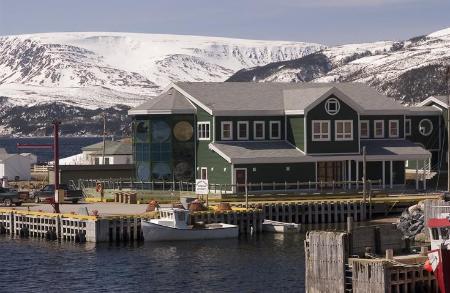Bringing a big world to a small community
Bonne Bay Marine Station engaging students and communities in environmental education

Alison Eaton is the Manager at Memorial’s Bonne Bay Marine Station, located in Norris Point, on the west coast of the island of Newfoundland, and an employee of Memorial's Faculty of Science. Operated by Memorial University and the Gros Morne Co-operating Association, the new building was established in 2002 with a mandate to cultivate an infrastructure and environment supportive of first-class teaching and research in marine science. The Station is dedicated to supporting significant activities in public education and regional economic development.
Today, the facility offers five undergraduate field courses and opportunistic graduate courses in Marine Biology, including Marine Principles and Techniques, Marine Mammals, Estuarine Fish Ecology and Experimental Marine Ecology of Newfoundland Waters.
Whichever course they choose, Ms. Eaton says students are constantly in the field, investigating the diversity of habitat and marine life that thrives just metres away. "They're always out in the boat," she says. "We're unique in that we're in the middle of it all. We are exposed to an estuary system, a saltwater system, a sub-arctic system and a temperate system. You have everything within an hour's cruise or drive."
Enrolling students from across the world, Ms. Eaton notes how these experiential courses have transformed a small rural town into an integrated embassy, enriched with a diversity of backgrounds. "We give the students a talk at the beginning of their courses," she says. "We tell them they are ambassadors for Memorial University. There are 20 of them in a community of 660 people, so telling them they are ambassadors makes them aware. In turn, the town really enjoys their presence."
The skills students learn during their field courses follow them throughout their careers, which Ms. Eaton says sometimes leads them back to Bonne Bay. "A lot of the marine interpreters we employ were students the year before," she says. "They undergo the field courses, they fall in love with the experiential learning, and they want to come back to engage with the public."
She refers to this as a "flow of information" in the community of Norris Point, adding how returned expertise is creating a positive ripple effect in the community. "They have such an impact on the local kids," she says. "They become educated. Kids interact directly with students and interpreters and learn about creatures they see locally all the time, but don't always consider."
This flow of information, Ms. Eaton says, also extends to the 11,000 plus tourists who visit the Station each year. "Marine interpreters take visitors out on boats and through the interactive aquarium," she says. "They'll often take home academic brochures, and the next thing I know, their nieces and nephews are enrolling in summer courses."
Boat trips and aquarium tours are just an element of the station's public engagement activities. Individuals from the community and beyond are invited to various initiatives each year, from public school visits to intertidal explorations.
One pinnacle event is the Oceans Day Community Beach Clean. Every June, the station collaborates with up to nine different sponsors such as Parks Canada, the Department of Fisheries and Oceans and Norris Point Town Council, to host a community clean-up at Wild Cove Beach. It's one of Ms. Eaton's favourite initiatives. "A lot of people care about Wild Cove," she says. "Everybody's there on the beach, working together."
Building community support, Ms. Eaton says, is crucial to the station's sustainable development. She highlights the station's involvement with The Community University Research for Recovery Alliance (CURRA), noting that CURRA researchers are always engaged and innovative. "They are conducting interdisciplinary research projects related to helping communities and organizations along the west coast develop strategies for the recovery of fish stocks and fishery communities," describes Allison. "The station would not be nearly as successful today without their support."
In Ms. Eaton's opinion, it all comes down to communications. As she explains, the Station is continuously engaging with the public to develop new ideas and suggestions for community involvement. "We're always working with the community on building new ideas, and because of that, our relationship is very strong," she says. "Having a centre like this makes for better researchers and better citizens," she says. "It gives people a stronger sense of understanding and environmental awareness, and that's very important for rural Newfoundland."